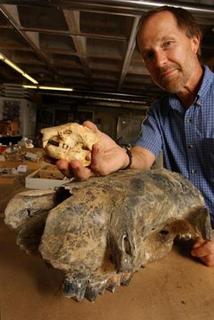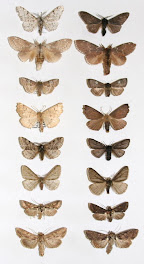
To the right is a picture of two skulls from different types of sloth. The bigger skull belongs to a species that weighed up to three tons and lived 15,000 years ago. The smaller skull belongs to a species that lives 6,000 years ago and weighed about 10 pounds.
Recent research on giant ground sloths provide support for the hypothesis that big game hunting was responsible for the extinction of megafauna:
Determining whether the first arrival of humans or the warm-up of the American continent at the end of the last Ice Age was responsible for the demise of prehistoric sloths has puzzled scientists because both events occurred at the same time, about 11,000 years ago. But by using radiocarbon to date fossils from Cuba and Hispaniola, where humans appeared later than on the North American continent, long after the last Ice Age occurred, UF ornithologist David Steadman was able to separate the two events.
He and his colleagues found the last record of West Indian ground sloths coincided with the arrival of humans 4,400 years ago. The results are published in a Proceedings of the National Academy of Sciences paper this week.
"If climate were the major factor driving the extinction of ground sloths, you would expect the extinctions to occur at about the same time on both the islands and the continent since climate change is a global event," Steadman said.
Steadman said he was not surprised to find that humans were more significant than changes in climate because most species of plants and animals can adjust to changes in temperature. However, the transition between the glacial and inter-glacial period, which resulted in shifts in habitat and the ranges of plants, may have made animal species more vulnerable than they otherwise would have been, he said.
"This is the first time it's been demonstrated for West Indian ground sloths, and West Indian ground sloths are sort of the poster child of big extinct West Indian mammals," he said. "I think this will go a long way to finally put to rest this whole idea that large extinct animals from the West Indies died out in the Ice Age during the Pleistocene Epoch."
You can go here, here, and here for an overview on what the debate is about.








